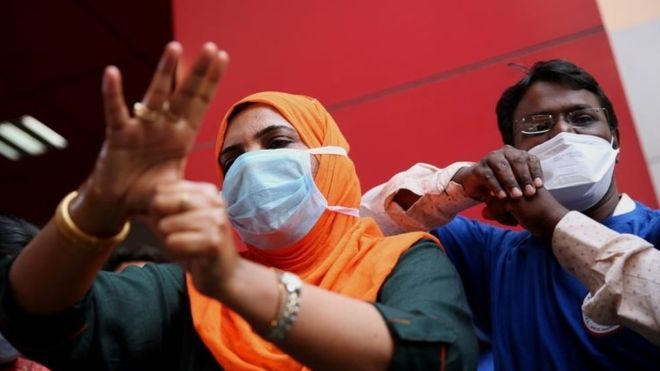 |
|
Coronavirus awareness campaigns have been held in a number of countries around the world
|
The current coronavirus outbreak is the biggest challenge for the world since World War Two, UN Secretary General António Guterres has warned.
He said it could bring a recession "that probably has no parallel in the recent past".
Mr Guterres was speaking at the launch of a UN report on the potential socioeconomic impact of the outbreak.
The number of confirmed cases around the world is now nearing 860,000, with more than 42,000 deaths.
The death toll in the US is now more than 3,800 - higher than that in China, where the outbreak began late last year.
More than 188,000 people in America have been infected, according to the data compiled by Johns Hopkins university.
About three out of four Americans are now, or about to be, under some form of lockdown, as more US states tighten measures to fight the coronavirus, which causes the Covid-19 disease.
Meanwhile, Spain, one of the worst hit countries, recorded 849 deaths in the last 24 hours - the highest number of fatalities in a single day.
In the UK, a total of 1,789 people have died on 30 March - a rise of 381, officials say. Among the victims was a 13-year-old boy, King's College Hospital Trust in London said.
What did Mr Guterres say?
Speaking at the UN headquarters in New York City, Mr Guterres said: "The new coronavirus disease is attacking societies at their core, claiming lives and people's livelihoods.
"Covid-19 is the greatest test that we have faced together since the formation of the United Nations."
The UN chief called for "an immediate co-ordinated health response to suppress transmission and end the pandemic".
Mr Guterres urged the industrialised nations to help those less developed, or potentially "face the nightmare of the disease spreading like wildfire".
The UN report estimates that up to 25 million jobs could be lost around the world as the result of the outbreak.
It also projects an up to 40% "downward pressure" on global foreign direct investment flows.
Grim death toll projections in US
US President Donald Trump had already announced the need to significantly extend social distancing guidelines beyond the two weeks just completed, saying people would need to stay at home as much as they possibly could for another month.
At Tuesday's White House briefing he turned the microphone over to his medical experts to help him persuade Americans to comply.
They explained that the aim was to bring down the number of new cases in the hotspots, especially New York, and prevent runaway outbreaks in other states.
Infectious disease expert Dr Anthony Fauci said steps taken so far had already begun to have an effect, and now was not the time to take the foot off the accelerator.
But even with strict measures the White House is projecting that between 100,000 and 240,000 Americans will die of the coronavirus pandemic.
New York will be the first to feel the brunt of that. It's focused on preparing enough beds and getting enough medical equipment for when the number of cases reaches its peak - in about two weeks' time.
What are the latest developments around the world?
-
Italy remains the worst affected country in the world. Tuesday's figures show the official death toll rose by 837 deaths to 12,428, more than the 812 recorded on Monday. Moreover, the number of new infections was 2,107, which is greater than the 1,648 the day before (but down from the equivalent numbers last week)
-
France has recorded 499 new hospital deaths in the last 24 hours, bringing the total to 3,523. This is the highest daily rise in such deaths in France since the outbreak began
- A 12-year-old girl has died in Belgium. She is thought to be the youngest Covid-19 victim in Europe. In total Belgium has lost 705 people in the outbreak
-
In Russia, lawmakers have passed an "anti-virus" package of laws including up to seven years in prison for serious violations of quarantine rules
- In India, the authorities are searching for hundreds of people who attended a religious event in the capital that has set off several Covid-19 clusters
-
In the Middle East, there are warnings that the outbreak is a ticking time-bomb for the unstable region
BBC